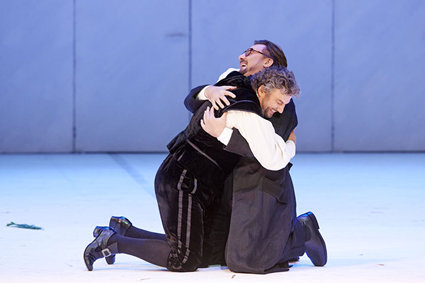| Opera Reviews | 20 April 2024 |
Jonas Kaufmann leads an impressive cast in this Don Carlos revivalby Moore Parker |
|
| Verdi: Don Carlos
Vienna State Opera 7 October 2020 |
|

Jonas Kaufmann (Don Carlos), Igor Golovatenko (Rodrigue)
|
|
|
After a break of some seven seasons, Peter Konwitschny’s 2004 production (his debut at the State Opera) of Verdi’s Don Carlos in its original French version returns to the State Opera repertoire. Konwitschny, who is now aged 75 and regarded by some as THE ‘enfant terrible’ of Regietheater for his controversial readings, initially presented this Don Carlos in Hamburg in 2001. The fresh cast is led by Bertrand de Billy - who conducted the initial run and has remained true to the production in subsequent revivals. Verdi was obliged to make severe cuts (eight in all) for the work’s 1867 world premiere in Paris - segments which have been fully restored by de Billy for this Vienna production. The composer was to spend decades reconsidering and revising Don Carlos with various versions appearing over the years. He ultimately discarded some fifty percent of the original to compose about a third of the familiar four act Italian version which premiered at La Scala in1884 - but which had in fact originally been intended for Vienna. The basic set - a stark white rectangular box with dwarfed doors on all sides houses a court essentially set in “period” costume (Johannes Leiacker) - while occasionally yielding to updates such as the mid-20C “ballet” choreographed as “Eboli’s Dream”. Here, the pregnant Eboli and party hostess in a middle-class domestic setting, burns the intended turkey at a dinner for her husband Carlos, Elisabeth, and Philippe. Rodrigue ultimately comes to the rescue with a delivery from ‘Posa’s Pizza’! The auto-da-fé springs to contemporary Fascism and in pre-Covid times physically encompassed the State Opera’s buffet rooms and other areas for the action. For this run, video of the Royals and upper Members of the Cloth are seen ascending the grand staircase while heretics are bludgeoned into subservience on screen. A shower of propaganda leaflets descends into the auditorium, while The Voice from Heaven appears in glitzy Marilyn Monroe look with slide shots of wartime executions projected above. Just a couple of examples that stir askant associations with Lindsay Kemp’s work in the 1970’s or Monty Python’s surreal sketches in an off the wall perspective which will surely continue to provoke, while providing food for thought. Konwitschny is, incidentally, scheduled to direct Thaïs in January 2021 at Vienna’s Theater an der Wien. Remarkably, this Don Carlos revival witnessed Jonas Kaufmann’s State Opera debut in a Verdi role. In mellifluous form, the Bavarian tenor is blessed with ample vocal stamina to demonstrate his lyricism and fine control through to the last passages of his final moments with Elisabeth (indeed, a highlight on this particular evening). His ability to blend registers and move seamlessly across available vocal dynamics reveal fine artistic intent - even if his idiosyncratic guttural approach is not to everyone’s taste. As Philippe II, Michele Pertusi lacks the ideal cavernous depths in his lower register, but created a solidly-forceful figure who ultimately well-suited the scale of this production. Both leading ladies were giving their house debuts, and provided excellent balance and credibility histrionically as well guaranteeing a captivating stage presence. Malin Byström’s Elisabeth began unusually flirtatiously (with Carlos) and progressed impressively as the plot developed, displaying considerable warmth in personality and vocal timbre, and with many impressive moments. However - despite evident facility - she appeared occasionally hesitant at the top of her range, sometimes lunging at notes, and therefore not quite enjoying her conceivable potential. Eve-Maud Hubeaux brought a slender but adequate mezzo of enviable range to Eboli, while paying knife-edge attention to the role’s abbellimenti, plus fierce intensity and sensuous grace to an interesting figure (one who is here advantaged by the five act version). Rodrigue too has important additional pages in Verdi’s score, and Igor Golovatenko made proud use of them with his gleaming, high-lying baritone and confident presentation. In all, the most impressive vocal rendition of the evening - if a touch bland in colour and personality. Roberto Scandiuzzi’s career at the State Opera dates back to 1992. In fine fettle, the Italian bass undertook his first Vienna Grand Inquisiteur with an imposing black bass now appropriately mellowed for the part. In good contrast, Dan Paul Dumitrescu’s Monk (Charles V) was nicely-underplayed (while unable to resist briefly flashing his crown from the folds covering his generous paunch) with ample-velvety tone. The remaining supports were nicely filled by Verginie Verrez (Thibault), Robert Bartneck (The Count of Lerma and the Herold), and Johanna Wallroth (A Voice from Heaven). Both the State Opera Chorus and Orchestra were in superb form - with due credit to Maestro de Billy, who drove the five-hour evening |
|
| Text ©
Moore Parker Photo © Wiener Staatsoper / Michael Pöhn |
|







